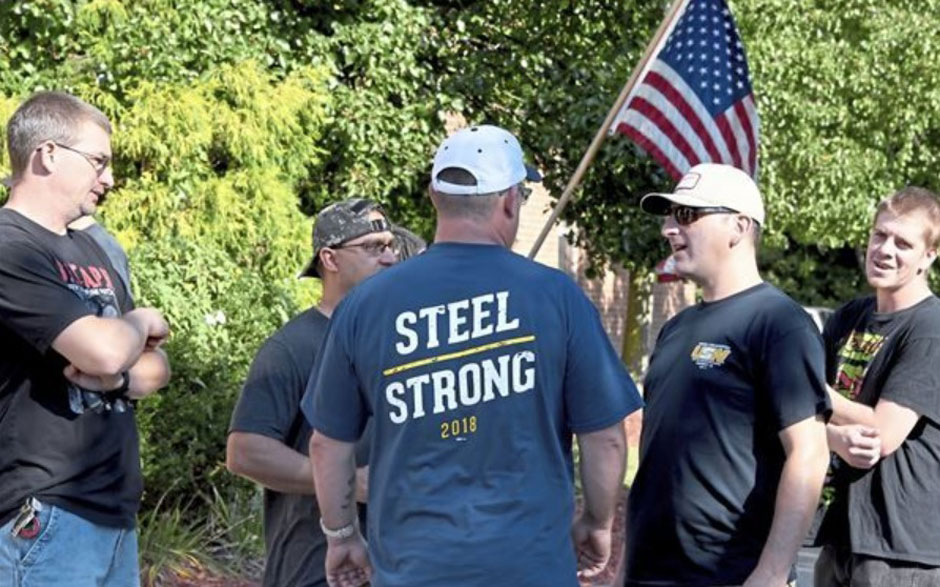
PITTSBURGH – Incessant demands for benefit cuts by the profitable U.S. Steel Company forced its Steelworkers members to approve a strike authorization, the union said.
And a similar strike OK could follow at the nation’s other huge steelmaker, ArcelorMittal.
U.S. Steel’s 16,000 workers “made a number of sacrifices over the past several years – including three years with a wage freeze – to put this company back on track,” said union President Leo Gerard. “Now that U.S. Steel is expecting to make a profit of nearly $2 billion this year, it is time for the workers to share in the success U.S. Steel is seeing.”
Bargaining over a new pact started in July and the old contract expired September 1. The strike authorization does not mean the workers will immediately walk, as the union must give the firm 48 hours’ notice before a strike starts.
Top company officials have given themselves more than $50 million in pay and bonuses since 2015 while the hourly workforce has not received a wage increase over the same period, the union explained. The workers toil at plants in Pennsylvania, Minnesota, northwestern Indiana – including the historic plant in Gary – Alabama. Michigan, Minnesota, Texas, Ohio, and Granite City, Ill.
The union previously noted Trump administration tariffs on dumped imported steel boosted demand and profits for U.S. Steel. The increases led to reopening production lines and recall of workers in Granite City in particular, in a hard-hit area of Illinois east of St. Louis.
“The USW did not come to the bargaining table looking for a fight,” said Vice President Tom Conway, its lead bargainer. “We came ready to work out an honest and fair agreement, but that is a far cry from what the company is demanding.”
U.S. Steel wants “major increases in benefit costs,” concessions that would reduce take-home pay and elimination of many on-the-job protections, the Steelworkers said. Three years ago, the firm, then facing bankruptcy, demanded and got – among other things – a contract-long wage freeze and a cut in weekly hours from 40 per worker to 32.
Instead of bargaining in good faith and recognizing the workers’ sacrifices, “the corporate shakedown of the working proletariat continues with calls for variable wages tied to the performance of the company stock and cuts to the medical benefits of retirees,” USW Local 4889 Rapid Response Coordinator Richard Cucarese added in an August 31 blog. His local represents USW members at the Fairless Works in Pennsylvania.
This time, U.S. Steel CEO David Burritt presented “an insulting offer of minimal pay raises that would immediately be wiped out by astronomical increases in what workers would have to pay for health insurance over a proposed 6-year period,” Cucarese added
“Burritt wanted to eliminate overtime rules, give the corporation the ability to shorten work weeks with no notice, change health plans with no notice and institute a plethora of other injustices that would wipe out 70 years of USW collectively bargained improvements for workers…Burritt is playing a dangerous game of chicken with the American people. With tariffs in place, and the possibility of Congress passing an infrastructure bill, projections are for the steel business to boom.”.
“America’s workers, not its fat-cat CEOs like Burritt, are the drivers of the capitalist machine. If a strike occurs, it will be because of Burritt’s refusal to allow workers a just portion of the profits their labor created.”
“With the company hugely profitable and industry conditions the best they have been in years, this is no time for U.S. Steel to pick a fight with workers who have been there to help them during the toughest times,” said USW District 7 Director Mike Millsap. “It’s time to come together and do what’s right for these workers, their families and their communities.”
The story is similar at ArcelorMittal, the union said.
“Three years ago, when steel prices bottomed out due to the unfair and illegal trade, management sought to unravel generations of collective bargaining progress with contract demands designed to reduce our standards of living and destroy the “safety nets” negotiated to protect us from layoffs and plant closures,” USW’s bargaining update noted.
“We resisted those concessions, and after almost 10 months of difficult negotiations, finally reached an agreement that provided enough flexibility for the company to survive the downturn – but more importantly – protected the security of our jobs, earnings, benefits and pensions. Since then, as one result of our union fighting for the government to crack down on trade cheaters, the market has rebounded.”
“Further, steelworkers at ArcelorMittal USA – already the most efficient workforce on the planet – continued to improve productivity, and as a result, the company has enjoyed financial success.” But management came to the table this year “with the same backward-thinking proposals” workers refused to accept three years ago.
“Judging from its ridiculously inferior proposed healthcare plans, refusal to make meaningful improvements in wages or pensions and concessionary demands regarding supplemental unemployment, incentive, vacation pay and our hot-rolled steel bonus, ArcelorMittal intends to test our solidarity and commitment to achieve a fair and equitable contract.”
“Our jobs are worth fighting for thanks to the hard work and determination of those who came before us. As long as we continue to work together and stand together to fight for justice, we will win the fair contract we have earned and deserve,” the ArcelorMittal bargainers said.

MOST POPULAR TODAY


Zionist organizations leading campaign to stop ceasefire resolutions in D.C. area

Communist Karol Cariola elected president of Chile’s legislature

Afghanistan’s socialist years: The promising future killed off by U.S. imperialism

High Court essentially bans demonstrations, freedom of assembly in Deep South






Comments